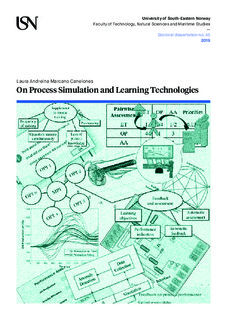| dc.contributor.author | Marcano Canelones, Laura Andreína | |
| dc.date.accessioned | 2019-10-31T10:54:39Z | |
| dc.date.available | 2019-10-31T10:54:39Z | |
| dc.date.issued | 2019-10-16 | |
| dc.identifier.isbn | 978-82-7206-532-3 | |
| dc.identifier.issn | 2535-5252 | |
| dc.identifier.uri | http://hdl.handle.net/11250/2625556 | |
| dc.description.abstract | This thesis provides additional insights into the field of simulator training. Al-though numerous studies have identified how to improve simulator technologies and team training practices, little analytic attention has been paid to how to enable more independent training. In this PhD work, different methodologies and techno-logies were tested to evaluate their effect on trainees independence during simulator training.
Simulator training is widely implemented in different industries and academia as a training tool. Usually, in a simulator training session there is an expert instructor who guides the users through the learning process with the simulator by giving verbal feedback, pausing the scenarios if necessary, and sometimes by develop-ing evaluations. The presence of an expert instructor during simulator training is of great importance for the trainees, if not indispensable, trainees rely on the instructor’s support. This dependency on instructors has become a significant chal-lenge both in the industry and academia, given that there is a deficit of instructors, either because of retirement or because of the continually increasing training de-mand. Therefore, it is critical to develop new technologies and methodologies that can help trainees be more independent and rely less on the instructor, which in turn will also decrease the load of the available instructors.
The main objective of this PhD thesis is to contribute to a solution to the challenge associated with the deficit of expert instructors in simulator training. Feedback is what makes the instructor so valuable. Therefore, it is the main focus of this work, developing a technology able to provide automatic feedback to trainees for improving individual technical skills, so that they can be more independent from the instructor’s help.
Three different automatic feedback methods were developed, two based on Oper-ator Performance Indicator values and one based on data mining. All the methods were developed using the dynamic simulator K-Spice, from Kongsberg Digital. The first method is an automatic assessment tool that provides numeric feedback. The second method gives prompt feedback in the form of pop-up windows. The third method is an online automatic feedback tool that provides information about the process status and offers a suggestion if it is requested. For the testing of each automatic feedback method, three simulator training modules were planned. The data gathered from each experiment consisted of observation notes, questionnaires, and pretest and posttest results. The participants of the study were master’s stu-dents from the University of South-Eastern Norway and bachelor students from OsloMet – Oslo Metropolitan University.
Further, the effect of trainees’ preparation before attending the simulator training session was also evaluated, this with the aim of studying whether preparation allows trainees to be more independent and request the instructor’s help less often than trainees who do not prepare. It was noticed that trainees who prepared themselves for the simulator training session considered they needed the instructor’s help less frequently than the trainees who did not prepare. Moreover, trainees that prepared for the session had a better performance in the pretest than those who did not.
The overall results show that automatic feedback does have a positive impact on trainees performance. However, it could not be demonstrated that, in fact, it allows trainees to be more independent. Nonetheless, in the case of the online automated feedback tool, it did make trainees who use it feel more confident than those who did not. It is concluded that an effective automatic feedback tool is one that can match as much as possible the feedback that would be given by an actual instructor. | nb_NO |
| dc.language.iso | eng | nb_NO |
| dc.publisher | University of South-Eastern Norway | nb_NO |
| dc.relation.ispartofseries | Doctoral dissertations at the University of South-Eastern Norway;45 | |
| dc.relation.haspart | Article 1: Marcano, L., Haugen, F.A., Sannerud, R. & Komulainen, T.: Review of simulator training practices for industrial operators: How can individual simulator training be enabled?. Safety Science 115, (2019), 414-424. https://doi.org/10.1016/j.ssci.2019.02.019 | nb_NO |
| dc.relation.haspart | Article 2: Marcano, L. & Komulainen, T: Constructive Assessment Method for Simulator Training. Proceedings of The 9th EUROSIM Congress on Modelling and Simulation, EUROSIM 2016, The 57th SIMS Conference on Simulation and Modelling SIMS 2016, p. 395-402. ISBN 978-91-7685-399-3. https://doi.org/10.3384/ecp17142395 | nb_NO |
| dc.relation.haspart | Article 3: Marcano, L., Komulainen, T. & Haugen, F.A.: Implementation of performance indicators for automatic assessment. Computer Aided Chemical Engineering 40, (2017), 2971-2976. https://doi.org/10.1016/B978-0-444-63965-3.50497-9 | nb_NO |
| dc.relation.haspart | Article 4: Marcano, L., Haugen, F.A., Sannerud, R. & Komulainen, T.: Effect of Automatic Feedback on Large-Scale Simulator Training. Submitted to IEEE Transactions on Learning Technologies. Not available in USN Open Archive | nb_NO |
| dc.relation.haspart | Article 5: Marcano, L., Yazidi, A., Manca, D. & Komulainen, T.: Using the concept of data enclosing tunnel as an online feedback tool for simulator training. Proceedings of the 59th International Conference of Scandinavian Simulation Society, SIMS 2018, p. 132-139, 2018. https://doi.org/10.3384/ecp18153132 | nb_NO |
| dc.relation.haspart | Article 6: Marcano, L., Yazidi, A., Manca, D. & Komulainen, T.: Methodology for Building a Data-Enclosing Tunnel for Automated Online-Feedback in Simulator Training. Preprint. Submitted to Computers & Chemical Engineering. The published version is available at https://doi.org/10.1016/j.compchemeng.2019.106621 | nb_NO |
| dc.rights.uri | http://creativecommons.org/licenses/by-nc-sa/4.0/deed.en | |
| dc.title | On Process Simulation and Learning Technologies | nb_NO |
| dc.type | Doctoral thesis | nb_NO |
| dc.description.version | publishedVersion | nb_NO |
| dc.rights.holder | © 2019 Laura Andreína Marcano Canelones | nb_NO |
| dc.subject.nsi | VDP::Technology: 500::Chemical engineering: 560::Chemical process engineering: 562 | nb_NO |
| dc.rights.license | © The Author, except otherwise stated | |

